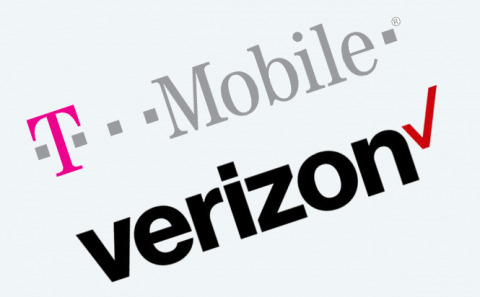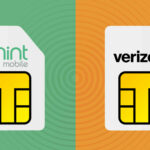Choosing a mobile carrier in the United States often comes down to a few major players, with T-Mobile or Verizon frequently topping the list for consideration. Both offer extensive networks, the latest devices, and a range of plans, but they have distinct strengths and weaknesses. This guide compares T-Mobile or Verizon across key areas to help you decide which might be the better fit for your needs in 2025.

The Heavyweights: An Overview of T-Mobile or Verizon
Both T-Mobile and Verizon are premier national wireless providers in the US. They operate vast networks covering the majority of the population, offer the newest smartphones, and compete fiercely on plans, features, and network performance. Your choice between T-Mobile or Verizon will likely depend on what factors you prioritize most.
Read more about: rack my Verizon order
Network Coverage: Reach vs. Reliability
Network coverage is often the most critical factor, and here’s where the two carriers traditionally differ:
- 4G LTE: Verizon has long held the reputation for the most geographically widespread and reliable 4G LTE network, often performing exceptionally well in rural and remote locations. While T-Mobile’s 4G LTE network is also extensive and covers most Americans, Verizon historically has had an edge in overall reach.
- 5G: T-Mobile currently boasts a significant lead in overall 5G coverage. Thanks to its early and aggressive deployment of mid-band 5G spectrum (marketed as “Ultra Capacity” or UC), T-Mobile provides 5G access to a larger percentage of the US population over a wider area than its competitors. Verizon’s premium 5G, known as “5G Ultra Wideband” (using high-band mmWave and mid-band C-band), offers blazing-fast speeds but is available in a smaller geographic footprint, though its nationwide 5G coverage (using lower bands similar to 4G) is broader and constantly expanding. Recent studies also show Verizon sharing top marks with T-Mobile for overall network reliability experience.
- Actionable Advice: Coverage maps are essential! Before deciding, check both T-Mobile’s and Verizon’s official coverage maps for the specific addresses where you live, work, and frequently travel. Network performance can vary significantly by location.
Speed Test Showdown: 5G Performance
When it comes to raw speed, particularly on 5G:
- T-Mobile: Consistently leads in independent, nationwide speed tests (like those from Opensignal or Ookla) for median 5G download speeds. Its strong mid-band 5G network delivers significantly faster average downloads than competitors across the board. T-Mobile also often leads in overall average download speeds (combining 5G and 4G).
- Verizon: While its median 5G speeds are generally lower than T-Mobile’s, Verizon’s 5G Ultra Wideband network can deliver exceptionally high peak speeds in areas where it’s deployed. Verizon also consistently scores well, often leading, in 5G upload speeds and metrics related to specific 5G experiences like gaming and live video streaming.
Plans & Pricing: Comparing Value Propositions
Pricing structures and included value differ:
- T-Mobile: Often promotes its newer “Experience” plans (like Experience More, Experience Beyond) which frequently include taxes and fees in the advertised monthly price, offering more predictable billing. These plans typically come with generous premium high-speed data allowances and mobile hotspot data. T-Mobile also heavily markets multi-line family savings.
- Verizon: Primarily uses its “myPlan” structure. Customers choose a base unlimited plan (like Unlimited Welcome, Unlimited Plus, or Unlimited Ultimate) and can then add optional perks (such as the Disney Bundle, Apple Music Family, Walmart+, etc.) for an additional fee per perk (commonly $10/month each). This offers flexibility but means the final cost depends on the number of perks selected. Verizon also offers significant discounts for multiple lines.
Both carriers offer various plan tiers, affecting the amount of premium data (data that isn’t slowed during network congestion), hotspot data limits, and video streaming quality.
Perks, Features, and International Use
Beyond talk, text, and data, consider the extras:
- T-Mobile: Known for bundling perks directly into its premium plans. Depending on the tier, this can include subscriptions like Netflix, Apple TV+, or Hulu. They also offer the “T-Mobile Tuesdays” app with weekly deals and discounts, and generous international benefits like free (often slower speed) data and texting in over 210 countries on eligible plans. Newer plans also include travel perks like Hilton discounts and AAA membership for a year.
- Verizon: The “myPlan” system allows customers to customize by adding only the perks they want, paying per perk. This provides choice but can increase the overall monthly cost compared to T-Mobile if you want multiple bundled services. Premium Verizon plans often include some international benefits, like a set number of free TravelPass days per month for use in many countries.
Customer Service Considerations
Customer satisfaction can be subjective, but recent studies offer some insight:
- Rankings: Recent J.D. Power studies (early 2025) have consistently ranked T-Mobile highest among the major national carriers for both overall Customer Care satisfaction and Wireless Retail Experience. Verizon typically ranks competitively but below T-Mobile in these specific satisfaction studies.
- Support Channels: Both carriers offer comprehensive support through phone lines, online chat, dedicated mobile apps (My Verizon, T-Life/T-Mobile), extensive online FAQs/support pages, and a large network of retail stores.
Deciding Between T-Mobile or Verizon: Key Takeaways
- Choose Verizon if: Your top priority is the broadest possible 4G LTE coverage and reliability, especially if you live or travel frequently in rural areas. You might also prefer Verizon if you value its network reputation, want its specific high-speed 5G Ultra Wideband performance where available, or if the “myPlan” perk system suits your needs and budget better.
- Choose T-Mobile if: You prioritize having the most extensive 5G coverage and the fastest average 5G download speeds. You might also lean towards T-Mobile if you appreciate having taxes/fees included in the plan price, value bundled perks like streaming services and generous international roaming, or if recent customer service rankings are important to you.
Final Advice: The “better” carrier truly depends on your individual circumstances. Always check the official coverage maps for your key locations and compare the current specific plan details, pricing, and promotions offered by T-Mobile or Verizon before making your final decision.


